What's Happening?
Pakistan's agriculture sector is experiencing a crisis due to soaring production costs and policy neglect. Farmers are struggling with high prices for fertilizers, pesticides, diesel, and electricity,
while global crop prices decline. Climate change impacts, such as erratic weather patterns and floods, further exacerbate the situation. The government has offered limited relief, constrained by budgetary pressures and international lender demands. Farmers are urged to adopt modern practices to reduce costs and improve yields, but challenges remain, including high fertilizer costs and exploitation by middlemen.
Why It's Important?
The crisis in Pakistan's agriculture sector has significant implications for food security and economic stability. As a major contributor to the country's economy, the decline in agricultural productivity could lead to increased poverty and food shortages. The situation highlights the need for policy reforms and investment in sustainable agricultural practices. Addressing these challenges is crucial to ensure the sector's survival and competitiveness in the global market. The government's response and support for farmers will be critical in mitigating the crisis and fostering long-term resilience.
What's Next?
Efforts to promote modern agricultural practices, such as efficient irrigation and renewable energy adoption, are expected to continue. The government may need to implement policy reforms to address the imbalance between input and output prices and reduce exploitation by middlemen. Collaboration with international organizations and stakeholders could provide additional support and resources for sustainable agriculture initiatives. Monitoring the sector's progress and challenges will be essential to ensure effective solutions and prevent further decline.











